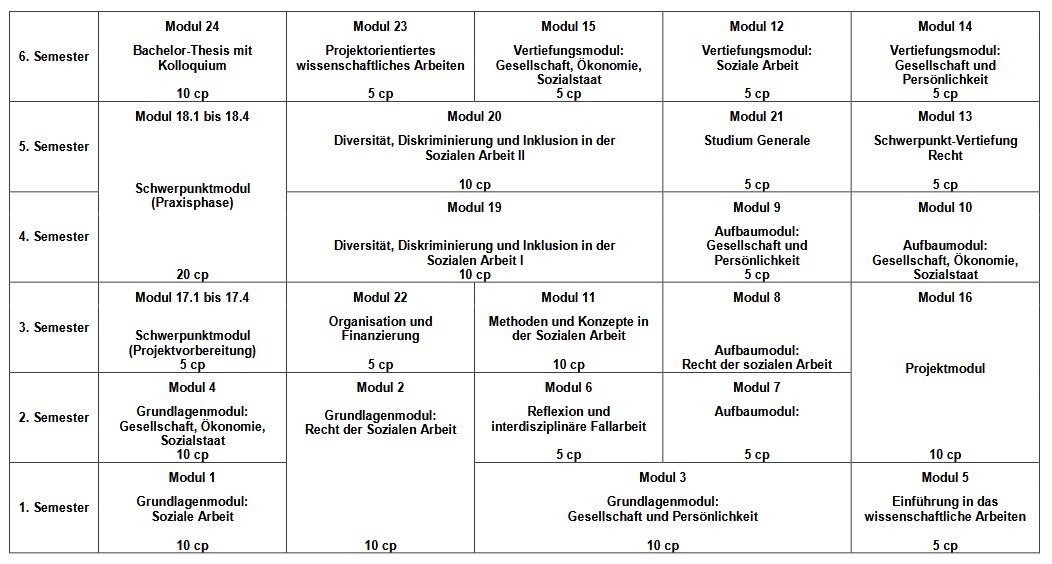Study organization
The degree course is designed for six semesters (or 180 ECTS credits) and entails a total of 24 modules; optionally a one-year long probationary year can be completed afterwards. Studying after 4 p.m. is to the largest extent possible. 30 ECTS shall be attained every semester. A share of the courses is offered in block seminars due to didactic reasons at the beginning and the end of the semester and as an intermediate block.
The registration for modules and examinations takes place in two separate steps in the degree course Social Work (B.A.):
- Registration for modules via Moodle
(In the first semester via the group registration on the “First semester platform” (Log-in required) in Moodle, as of the second semester via the Moodle course room “Module registration Bachelor Social Work (Modulbelegung Bachelor Soziale Arbeit)” - Examination registration for the modules takes place via the student portal FranCa of the Frankfurt University of Applied Sciences under the tile Examination registration & deregistration.
Further information and the respective deadlines can be accessed in time via CampUAS.
Current news
Please inform yourself in addition to the schedule in the module manual about contents and information on individual modules.
Please note: Please update this website on a regular basis and delete your browser cache, if you open this page again in order to ensure that you are shown the most recent version of the schedule.
Schedule BASA & BASA :transnational winter semester 2018/2019 Version: November 26, 2018
Comments on the schedule BASA & BASA :transnational winter semester 2018/2019 Version: August 10, 2018
Information on the interdisciplinary study module "interdisziplinäres Studium Generale" can be found here.
Archive
Schedule summer semester 2018 Version: May 29, 2018
Schedule ESG winter semester 2017/18 Version: November 16, 2017
Schedule winter semester 2017/18 Version: November 29, 2017
At the beginning of studies a first semester orientation takes place involving the entire faculty. Afterwards the following obligatory events take place: Introduction into esthetic work (Module 5-1).
More information and dates have been given to you in the first semester letter. Information on the beginning of your regular and continuing lectures can be found in the academic calendar.
Here you can find general information for first year students and the program for the first semester orientation.
First semester groups
The first semester is studied in an allocated group. The time you have to be present at the institution is maximally 4.5 hours per day. One of the first semester groups is offered particularly to employed students and begins in the afternoon (as of 2:15 p.m.). First semester students can choose groups online; relevant information is included in the first semester information letter, which you received during your enrollment.
During the first semester, you will study in "first semester groups". This shall help you find your way into the course of study. The time you have to be present at the institution is maximally 4.5 hours per day. One of the first semester groups is offered particularly to employed students and begins in the afternoon (as of 2:15 p.m.). First semester students can choose groups online; relevant information is included in the first semester information letter, which you received during your enrollment. You can freely choose your lectures as of the second semester. There are eight different first semester groups that differ with respect to the "free day" and the beginning times. The group size is limited. Every first semester group has a student tutor. You will get to know him/her during the orientation week.
Integration courses for international students
Another note for international students: Please make use of the integration courses that shall facilitate your studies at the Frankfurt University of Applied Sciences.
E-Learning
We use the e-learning portal CampUAS (Moodle) to support our seminar offers. Most seminars that require the students to be present, are accompanied by numerous didactic functions in CampUAS.
Link to CampUAS



